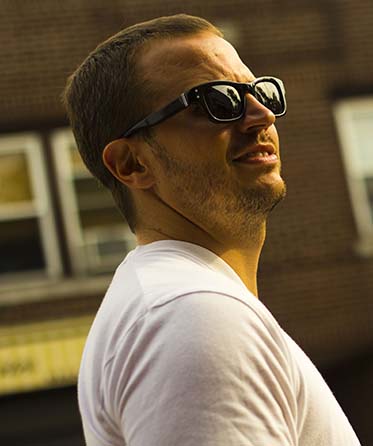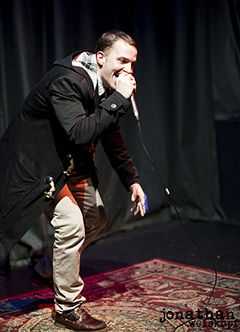 Rapper B. Nice brings originality with his conscious style of Hip-hop with songs like “Mr. Officer,” “Creators” and “Hey Hey!” that not only send positive messages, but also serve as great entertainment. His music also sparks thought and conversation among listeners and fans. A native of Long Island, NY, B. Nice has been an avid fan of Hip-Hop since the early days, growing up on the likes of Grand Puba, Public Enemy, LL Cool J and the other artists of that era. He was able to find his voice at a young age with music and bridge the gaps of both adversity and diversity. Newcomers to his music will soon take a liking to his lyrical/musical style. It’s a fresh change from those artists that are will to do any and everything to garner fame. B. Nice is one of the few artists in today’s music that refuses to abandon originality and morality in order to cash a check. Check out our full interview with the emcee.
Rapper B. Nice brings originality with his conscious style of Hip-hop with songs like “Mr. Officer,” “Creators” and “Hey Hey!” that not only send positive messages, but also serve as great entertainment. His music also sparks thought and conversation among listeners and fans. A native of Long Island, NY, B. Nice has been an avid fan of Hip-Hop since the early days, growing up on the likes of Grand Puba, Public Enemy, LL Cool J and the other artists of that era. He was able to find his voice at a young age with music and bridge the gaps of both adversity and diversity. Newcomers to his music will soon take a liking to his lyrical/musical style. It’s a fresh change from those artists that are will to do any and everything to garner fame. B. Nice is one of the few artists in today’s music that refuses to abandon originality and morality in order to cash a check. Check out our full interview with the emcee.
Parlé Magazine: Why the name B. Nice?
B. NICE: It came to me organically, my real name is Brian. When I was rapping in college people would say, “Yo B is Nice,” so I just took that and ran with it. It reminds me of an old school Hip-Hop name.
Parlé: What was it like for you when you first performed in front of an audience?
B. NICE: It was nerve wrecking at first, but I wasn’t too worried. I’m so used to rapping in cyphers with other people. If you’re not good there, they’ll let you know right away. That was a lot harder for me than any stage I’ve been on. Now, I’m genuinely well known for my live shows, I put myself into everything I do.
Parlé: Have you ever had a show that made you question yourself as a rapper/artist?
B. NICE: In the summer of 2002, I was performing with some others at a charity basketball game at Georgetown University in Washington, D.C. Allen Iverson was there promoting his nonprofit organization at the time, no one knew who we were and they were probably wondering why we were there. They played these corny beats for us to rap over and the crowd was not feeling us at all. On the car ride from D.C. to New York, it was the longest, quietest ride I’ve ever been in. For me, it made me want to come harder with what I have and who I am both professionally and personally.
Parlé: How long have you been in the rap game?
B. NICE: I want to say since seventh grade, I would write songs to instrumentals, but I’ve been writing, touring and performing since 2000.
Parlé: Have you been able to collaborate musically with any well-known artists?
B. NICE: I haven’t worked with anyone in the mainstream as of yet but I have opened up for people like Soul For Real, Joell Ortiz, Cory Gunz and Jadakiss. More recently, I’ve been working with Homeboy Sandman for my next album. I recommend people check him out, he was in law school on his way to becoming a lawyer but he quit it all to become a rapper.
Parlé: If you could work with anyone today, who would it be?
B. NICE: So many names come to mind, it’s hard to answer that one. I would definitely like to work with Roc Marciano, he was a part of Busta Rhymes’ Flip Mode Squad. Him and I have very different styles so it would be nice to see what would happen. I like the behind the scenes work he puts into his music like the beats and his wordplay is so vivid and unreal.
Parlé: Has it been difficult to remain true to yourself as an artist?
B. NICE: When I was sophomore in college rapping, an agent from Epic Records offered me a developmental deal for 30 days, but he wanted me to basically clown myself. Looking back now that I’m older and wiser, I was trying to do the music that others would like because I hadn’t found myself yet but now I make music for myself. It all comes with growth and as a person who’s always growing, changing and evolving I’ve learned so much about life and myself with Hip-Hop.

Parlé: What separates your music from anything that’s out today?
B. NICE: Hip-Hop music doesn’t always have to be about drugs, guns and unlimited funds. As an artist I try to promote not only realism but positivity with my music.
Parlé: For those readers who are not familiar with your music, why should they check out your music?
B. NICE:It’s different in a good way. Back in the day, people would party to music by artists like Earth, Wind & Fire. It was happy feel good music that most people could relate to. Nowadays when you go out to clubs, you’re likely to hear music that promotes a negative lifestyle. I want your readers and listeners to know that it doesn’t have to be that way. I want to bring that old way back to how it used to be, Hip-Hop doesn’t always have to be about negativity. As an artist I try to promote a positive way of living with my music.
Parlé: Why do you think a lot of Hip-Hop/Rap today seems to promote negative lifestyles?
B. NICE: It’s not everyone doing it, but I do have a theory as to why that’s happening. The corporations and industry that put out a lot of the music about guns, drinking and drugs are themselves sponsored by companies that help build a lot of these private prisons. Music that promotes criminality and criminal behavior is like supplying a problem to their solution, which are the private prisons. They make a lot of money off records sales but not nearly as much as they do with private prisons. There are so many things you can rap about but it seems like the same things are being recycled in the mainstream because that’s what sells.
 Parlé: That’s deep! Who are your musical influences?
Parlé: That’s deep! Who are your musical influences?
B. NICE: I look to folks like Public Enemy. LL Cool J has been a major influence; I thought he was one of the best rappers when I was coming up. DJ Jazzy Jeff and The Fresh Prince, when they came out with the song “Parents Just Don’t Understand” I remember relating so much to that because I was the exact same way when my mom was trying to buy me school clothes as a kid. Even though I like Kool G Rap, I couldn’t personally relate to living a gangsta lifestyle, all I knew growing up was that he (Kool G Rap) raps really good, but I couldn’t understand it. Grand Puba has a song about how they distort the history of black people in an attempt to keep them down. Even though I’m Italian-American which would classify me as white, I could relate to that song so much. It broadened my perception of the world and people around me.
Parlé: Where can the readers, who may not be familiar with your music check you out?
B. NICE: Check me out on Soundcloud.com/birkelab, bnice.bandcamp.com. I’m on a lot of digital outlets like Itunes, Spotify and Shazam. I recently dropped an EP called Meaning To Share that you can find on any one of those just mentioned.
Parlé: Are you connected to social media at all?
B. NICE: I’ve been on a social media fast for a while but you find me on twitter @birkelab and IG: @birkelab
Parlé: Any final words for the readers?
B. NICE: Be yourself. Find something that you do that no one else does. Stick to your truth and don’t play yourself for attention, money and fame.
Wise words from a true artist. Be sure to check out his EP, Meaning To Share online now!

